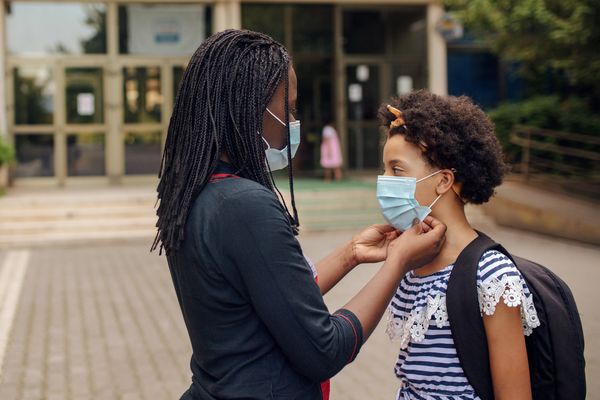Even if you've dreaded it for years, this is likely the big moment your teen has been waiting for—it's time to go to college. They've waved good-bye and run off with their new roommates. They're finally on their own, but where does that leave you? Probably worrying about them out there all alone.
We know you want to help, so we've created a tip sheet for you to give them as they depart on their journey. They may laugh as you hand it to them, but trust us, they'll appreciate it later.
Tips for Staying Healthy at College
The Stress Challenge
It's all on me! You can feel stressed out by having so much to do. Social relationships with friends, roommates or dating partners may add pressure too. You'll have less stress if you:
- Work with a schedule: Keep a daily calendar (electronic or paper), with times of all classes, activities, due dates for assignments and personal plans noted. A quick glance will help you feel more in control.
- Exercise regularly: Working up a sweat helps you work out pent-up stress. Head for the gym or a run or a bike ride at least three times a week.
- Take a break: Plan daily time for hanging with your friends or just relaxing.
The Sleep Debt Challenge
I'm so tired! Just as money debt hurts your financial life, sleep debt (having less than about eight hours sleep each night) hurts your physical and mental life. When you're in sleep debt, you feel more exhausted, stressed and less able to perform well. If you sleep only six hours a night, the National Sleep Foundation says you build up a sleep debt of 14 hours in just one week! To get your sleep cycle back on track:
- Go to sleep and wake up at the same times each day: Allow for at least eight hours of sleep. Avoid sleeping late to "catch up." That creates insomnia, as do naps longer than 20 minutes.
- Don't eat or drink late at night: A midnight meal activates your body instead of letting it go to sleep. Caffeine and nicotine are also stimulants.
- Exercise before late evening: Working out helps you fall asleep but may keep you awake if done too close to bedtime.
- Set the stage for sleep: Agree with your roommates on quiet hours (use earplugs, keep lights low or off, take phone calls outside). Lower the room temperature, if you can. Relax yourself before bed with a warm mug of milk (microwave for about a minute) or a hot shower.
- Don’t take pills to stay awake or fall asleep: It's tempting to use pills, energy drinks or coffee to cram for classes or to take pills to sleep, but they disrupt your sleep patterns and some may be harmful. Talk with someone at the student health center if you think you need help sleeping.
Staying Well: Avoiding Campus "Bugs"
Germs spread easily at college. One sneeze and infection travels to anyone who lives, eats, studies or goes to class nearby. Some freshmen may be especially susceptible to illnesses. A study from Carnegie Mellon University showed that first-year students who feel lonely have weaker immune systems than those who have a few friends. You'll stay healthier if you:
- Eat regular meals: Have a real breakfast (not that Boston cream doughnut!) and a healthy lunch and dinner—with limited fried foods, more vegetables and fruits and lots of low- or nonfat dairy products. Don't try to live on junk food snacks, pizza and soda, even if you're pressed for time.
- Wash your hands often: This is the best way to keep from getting what's going around.
- Rest: Don't force yourself to stay on schedule when you're sick. A day spent in bed may help a lot. If you have a low-grade fever (under 101°), take acetaminophen or another fever reducer your family health care professional recommends, and drink a lot of water, sports drinks or juice.
- What's the student health center and why do I need it? Most colleges have an on-campus health service to help you with medical care, information and counseling. The professional staff members are experts in the needs of college students. If you're concerned about a physical or emotional health issue, do the following:
- Take immediate action: Call your student health center (or whatever it's called at your college) for these urgent situations:
- a fever of 101° or more
- repeated vomiting or diarrhea
- internal pain of any sort
- difficulty breathing or shortness of breath
- a cough that hangs on
- chest or upper abdominal pain or pressure
- sudden dizziness, a sudden severe headache or a change in vision
- depression or sleeplessness
- suicidal or homicidal feelings
- coughing up or vomiting blood
- bleeding that won't stop
- physical and/or sexual assault (even if you don't want to report the incident)
- any medical emergency
- Make an appointment: If your health concern isn't urgent, call the student health center to schedule a medical visit. Most can refer you to specialists for care they don't provide.
Beware of Thieves!
Hey, dude, where's my stuff? Thieves target college dorms because the pickings are so good—room after room filled with the latest electronic gear, easy-to-grab laptops and expensive clothing. And often these goods are left for hours in unoccupied, unlocked rooms.
Remember the basics:
- Mark valuables with your name.
- Lock your room at all times.
- Don't prop open doors to rooms, hallways or the outside.
- Lock windows.
- Always carry your key or keycard with you.
- Never leave a door unlocked for a friend or roommate.
Physical Assaults and Rapes: What You Need to Know
Don't think it could never happen to you. Physical assaults and rapes do happen on college campuses, to students just like you. Some attacks are committed by strangers, others by friends or acquaintances. To stay safe, whether you're male or female, do the following:
- Go with a crowd: Take one or more friends along when you go out, especially at night, or when exercising outdoors at dawn or dusk. If you must walk alone during these times, hold your cell phone and either talk, or act as if you are talking, to someone on it.
- Head for the light: If you see someone following you, go toward a brightly lit restaurant or area with other people. Use ATMs inside convenience stores rather than on the street.
- Pick up the phone: Many colleges have lighted security phones placed on poles around campus to connect directly with university police. Use these phones to get help quickly.
- Protection at parties and clubs: Arrive and leave parties with a friend you trust. Agree to find each other if you get separated. Never drink anything you haven't opened yourself. Stay in the main party area. And, most importantly of all, leave any situation if you feel uncomfortable.
- Safe at home: Keep the door to your dorm room locked, whether you are inside, across the hall or away.
- Get treatment: If you've been assaulted or raped, get help immediately. Do not shower or change clothes. Ask a friend to go with you to the student health center or hospital emergency room.







